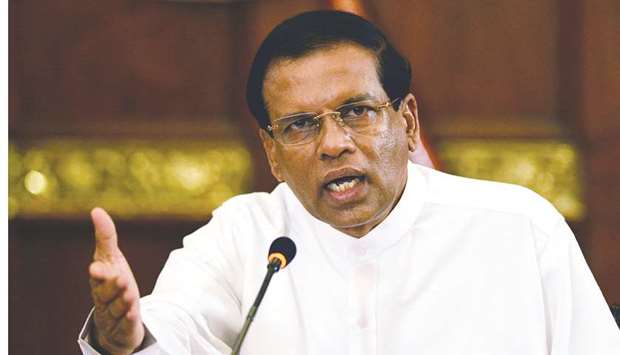Sri Lanka’s prime minister took over the key law and order ministry yesterday as part of a cabinet reshuffle, after a local election defeat sparked calls for his
resignation.
Premier Ranil Wickremesinghe was sworn in to the ministerial post yesterday, a week after the minister in charge of the police, Sagala Ratnayaka, resigned amid accusations he had failed to prosecute members of the former regime.
Several other ministerial changes were also made yesterday while another reshuffle will be carried out within two weeks, President Maithripala Sirisena said after the swearing-in ceremony.
“These changes as well as those soon to be made on the UPFA side of the government will strengthen us to better serve our people,” Sirisena said referring to his United People’s Freedom Alliance, the junior partner in government.
“The government needs to improve its policies, programmes and actions to serve our people better.” Sirisena’s office quoted him as saying in a tweet.
Coalition members had demanded urgent reforms after they were heavily defeated in the February 10 local council elections by the new party of former strongman president Mahinda Rajapakse.
Wickremesinghe said last week the defeat was due to the government’s failure to prosecute those responsible for high-profile murders of journalists and major corruption during Rajapakse’s decade in power.
Wickremesinghe will hold the law and order ministry in addition to being the minister of national policies and
economic affairs.
Last week, he dismissed calls for his resignation and insisted that he could be removed only by parliament, where his party enjoys a comfortable majority.
However he has admitted that his administration was slow to deliver on a 2015 election promise to prosecute corrupt members of the former regime.
Rajapakse, whose family wields enormous influence in Sri Lanka, has staged a dramatic comeback since launching his Sri Lanka Podujana Peramuna or People’s Front party.
Rajapakse’s party comfortably won in all regions apart from the battle-scarred north and east where, as president, he brutally crushed a separatist Tamil movement to end the island’s ethnic war in 2009.
The former president has demanded a snap general election and challenged his successor’s right to govern after his
drubbing in the polls.
The central bank on February 15 kept its benchmark interest rates unchanged to help bolster an economy that’s been hit by bad weather across the South Asian island.
The International Monetary Fund has said it supports Sri Lanka maintaining a tightening bias and the monetary authority should contain credit growth and inflation. The central bank has been on hold since raising rates in March last year to bolster the currency. The rupee is down 1.1% so far this year.

Sri Lankan President Maithripala Sirisena addresses a press conference in Colombo.
